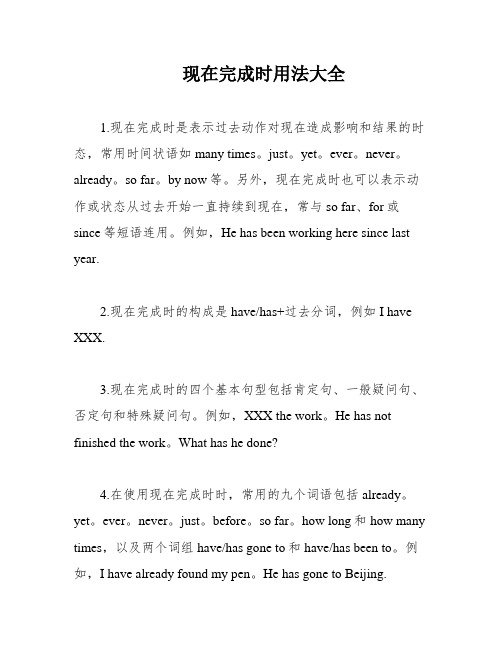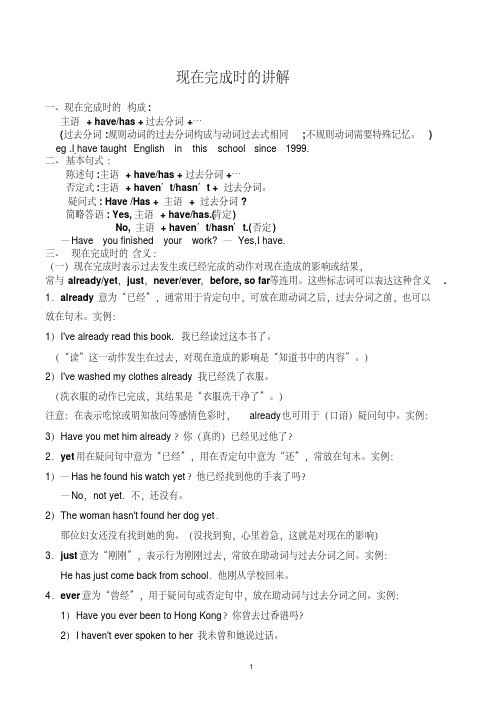现在完成时
- 格式:doc
- 大小:79.20 KB
- 文档页数:6

现在完成时常用句型1. “I have already eaten breakfast.” 早上我起来后,妈妈问我:“宝贝,吃早餐了吗?”我拍拍肚子说:“I have already eaten breakfast.”2. “You have juste back from school.” 我一进家门,爸爸就说:“You have juste back from school.”3. “We have played this game before.” 小伙伴们来找我玩游戏,其中一个说:“我们玩这个游戏吧。
”我回答:“We have played this game before.”4. “He has already done his homework.” 我去找小明玩,他妈妈说:“他在房间呢,He has already done his homework.”5. “She has watched this movie many times.” 我们讨论电影的时候,小红说:“这部电影超好看。
”我回应:“She has watched this movie many times.”6. “They have gone to the park.” 我问弟弟妹妹们去哪了,妈妈说:“They have gone to the park.”7. “I have known him for a long time.” 朋友好奇地问我和那个人认识多久了,我笑着说:“I have known him for a long time.”8. “You have read this book, haven't you?” 我拿着书问同桌:“You have read this book, haven't you?”9. “We have visited that place before.” 一家人商量去哪里玩,我突然想起说:“We have visited that place before.”10. “He has made a lot of mistakes.” 老师看着小明的作业说:“He has made a lot of mistakes.”。

完成时态总结一、现在完成时(Present Perfect)现在完成时用于描述已经发生的动作或事件,与当前的状况或状态有关。
它的结构是“have/has + 过去分词”。
现在完成时常用的情况有以下几种:1.表示过去发生的动作对现在造成的影响或结果。
例如:–I have finished my homework.(我已经完成了作业。
)–She has gone to bed.(她已经上床睡觉了。
)2.表示过去发生的动作与现在持续或重复的动作有关。
例如:–I have visited this museum three times.(我已经参观过这个博物馆三次了。
)–They have lived in this city for five years.(他们在这个城市住了五年了。
)3.表示有经验或经历过某事。
例如:–I have seen that movie before.(我以前看过那部电影。
)–Have you ever been to Paris?(你去过巴黎吗?)4.表示刚刚发生的动作或新闻。
例如:–The plane has just landed.(飞机刚刚降落。
)–I have received an email from my boss.(我收到了老板的邮件。
)二、过去完成时(Past Perfect)过去完成时用于描述在过去某一时间或动作之前已经发生的动作或事件,它的结构是“had + 过去分词”。
过去完成时常用的情况有以下几种:1.表示在过去某一时间点之前发生的动作。
例如:–She had already left when I arrived.(当我到达时,她已经离开了。
)–They had finished dinner before the guests arrived.(客人到达之前,他们已经吃完晚饭了。
)2.表示过去某一动作之前已经完成的动作。
例如:–I had studied English for two years before I moved to Canada.(在我搬到加拿大之前,我已经学习了两年英语。

现在完成时用法大全1.现在完成时是表示过去动作对现在造成影响和结果的时态,常用时间状语如many times。
just。
yet。
ever。
never。
already。
so far。
by now等。
另外,现在完成时也可以表示动作或状态从过去开始一直持续到现在,常与so far、for或since等短语连用。
例如,He has been working here since last year.2.现在完成时的构成是have/has+过去分词,例如I have XXX.3.现在完成时的四个基本句型包括肯定句、一般疑问句、否定句和特殊疑问句。
例如,XXX the work。
He has not finished the work。
What has he done?4.在使用现在完成时时,常用的九个词语包括already。
yet。
ever。
never。
just。
before。
so far。
how long和how many times,以及两个词组have/has gone to和have/has been to。
例如,I have already found my pen。
He has gone to Beijing.Jim has been living in this city for two months。
Lucy has been living in Beijing since three years ago。
He has been in China since he arrived here。
If there is no time adverb in the sentence。
the present perfect tense is often used to convey the meaning of "already" in Chinese。
For example。
"Have you lost your library book?" can be translated as "你已经弄丢了从图书馆借的那本书吗?"The present perfect tense is also commonly used in the following sentence patterns: "They have planted many trees in the last few years," "This is the best book I have ever read," and "It is the first time I have played computer games."In the present perfect tense。

现在完成时的讲解一、现在完成时的构成:主语+ have/has + 过去分词+…(过去分词:规则动词的过去分词构成与动词过去式相同;不规则动词需要特殊记忆。
) eg .I have taught English in this school since 1999.二、基本句式:陈述句:主语+ have/has + 过去分词+…否定式:主语+ haven’t/hasn’t + 过去分词。
疑问式: Have /Has + 主语+ 过去分词?简略答语: Yes, 主语+ have/has.(肯定)No, 主语+ haven’t/hasn’t.(否定)—Have you finished your work? —Yes,I have.三、现在完成时的含义:(一)现在完成时表示过去发生或已经完成的动作对现在造成的影响或结果,常与already/yet,just,never/ever,before, so far等连用。
这些标志词可以表达这种含义. 1.already意为“已经”,通常用于肯定句中,可放在助动词之后,过去分词之前,也可以放在句末。
实例:1)I've already read this book. 我已经读过这本书了。
(“读”这一动作发生在过去,对现在造成的影响是“知道书中的内容”。
)2)I've washed my clothes already.我已经洗了衣服。
(洗衣服的动作已完成,其结果是“衣服冼干净了”。
)注意:在表示吃惊或明知故问等感情色彩时,already也可用于(口语)疑问句中。
实例:3)Have you met him already ?你(真的)已经见过他了?2.yet用在疑问句中意为“已经”,用在否定句中意为“还”,常放在句末。
实例:1)—Has he found his watch yet ?他已经找到他的手表了吗?—No,not yet.不,还没有。
2)The woman hasn't found her dog yet .那位妇女还没有找到她的狗。


现在完成时第一部分现在完成时.....表示过去发生或已经完成的动作对现在造成的影响或结果,也可表示过去已经开始,一直延续到现在的动作或状态。
1.基本结构:主语+ have/has + 过去分词(done)+ 其他。
(当主语是第三人称单数时用has,其余人称用have。
过去分词:规则动词的过去分词构成与动词过去式相同;不规则动词需要特殊记忆。
2.否定式:①主语+ haven't/hasn't + 过去分词+ 其他。
②主语+ have/has + not + 过去分词+ 其他。
(现在完成时的否定式就是在has/have后加not,have not可缩写为haven’t,has not可缩写为hasn’t。
)3.疑问式: Have /Has + 主语+ 过去分词+ 其他?简略答语: Yes, 主语+ have/has.(肯定回答)No, 主语+ haven't/hasn't.(否定回答)4.特殊疑问句:特殊疑问词+ 一般疑问句(have/has+主语+过去分词+其他)?例句:1.He has lived in Shanghai for 10 years.(肯定句)2.Has he lived in Shanghai for 10 years? (一般疑问句)Yes,he has. (肯定回答)No,he hasn't. (否定回答)3.He hasn't lived in Shanghai for 10 years. (否定句)4.How long has he lived in Shanghai? (特殊疑问句)5.Where has he lived for 10 years? (特殊疑问句)①当have/has被用在现在完成时态中时,它可以和前面的代名词一起组成缩写形式。
have可缩写为’ve,has可缩写为’s。
如:I've ,He's②现在完成时用not来表达否定形式。
现在完成时的用法讲解一、现在完成时的基本概念和构成现在完成时是英语中一个常用的时态,用来表示过去发生或已经完成的动作与现在的关系。
它由助动词“have/has”和动词的过去分词构成,其中“have”用于第一人称和第二人称,而“has”则用于第三人称单数。
二、现在完成时的基本用法1. 表示过去开始并持续到现在的动作或状态:例如:I have worked in this company for five years.(我已经在这家公司工作五年了。
)2. 表示过去曾经做过的事情对当前造成影响或产生结果:例如:She has lost her keys, so she can't open the door.(她丢失了钥匙,所以无法打开门。
)3. 表示某个时间点之前已经发生或完成的动作:例如:I have already finished my homework.(我已经完成了我的家庭作业。
)三、与时间状语连用的特殊情况1. 使用含有未来概念的时间状语时,需使用将来完成时代替现在完成时:例如:By next week, I will have finished this project.(到下周,我将会完成这个项目。
)2. 使用指定时间点为止加上“for”或“since”的状语时:例如:I have been studying English for five years.(我已经学习英语五年了。
)例如:He has lived in London since 2010.(他自2010年以来一直住在伦敦。
)四、与其他时态的对比1. 与一般过去时对比:现在完成时强调动作带来的结果或影响,而一般过去时则着重指明具体发生的时间点。
2. 与过去完成时对比:现在完成时强调过去到现在产生的影响或结果,而过去完成时则强调过去某个时间点之前已经完成的动作。
3. 与将来完成时对比:将来完成时用于表示将来某个时间点之前已经发生或已经完成的事情,而现在完成时则用于表示从过去某个时间点开始到现在所持续的动作或状态。
现在完成时的概念和结构
现在完成时是英语中的一种时态,用来表示过去发生的某一动作或状态一直持续到现在,并对现在造成影响或者有可能继续延续到将来。
现在完成时强调的是动作与现在的关系,而非动作发生的具体时间。
现在完成时的基本结构如下:
1.肯定句:主语 + have/has + 过去分词
例如:I have eaten breakfast.(我已经吃过早餐了。
)
2.否定句:主语 + have/has + not + 过去分词
例如:I have not finished my homework.(我还没有完成作业。
)3.一般疑问句:Have/Has + 主语 + 过去分词?
例如:Have you seen this movie before? (你以前看过这部电影吗?)
4.特殊疑问句:特殊疑问词 + have/has + 主语 + 过去分词?
例如:What have you done today? (你今天做了什么?)
其中,have/has 是助动词,用于构成现在完成时,过去分词是动词的完成形式,如eat的过去分词是eaten。
"主语"根据实际情况变化,单数第三人称用has,其他人称用have。
现在完成时的概念、构成及用法一、概念现在完成时表示到说话时为止(或到现在为止)已经发生或完成了(不一定结束)的动作或状态。
过去某一时间开始并一直持续到现在并且有可能还会持续的动作或状态。
二、构成现在完成时是由助动词have(has)+动词的过去分词构成。
助动词have(has)表明事情发生于现在。
它和主语的人称、数要保持一致。
过去分词在句子中做谓语,说明句子的含义。
三、用法1. 动作发生在过去某个不确定的时间,但对现在有某种影响和结果。
常被just、already、yet 等副词修饰。
如:-Have you had lunch yet? -Yes, I have. I've just had it.你(已经)吃午饭了吗?我刚刚吃过。
(现在我不饿了)2. 表示从过去某一时刻开始一直持续到现在的动作或状态。
这个动作可能刚停止,可能仍然在进行。
常带有for和since等表示一段时间的状语。
如:He has taught here since 1981他自1981年就在这儿教书。
(可能还要继续教)I have't seen her for four years.我有四年没见到她了。
3. 表示说话前发生过一次或多次的动作,现在成为一种经验,一般译为汉语“过”,常带有twice, ever, never, three times等时间状语。
如:I have been to Beijing twice.我去过北京二次。
四、现在完成时的时间状语1. 现在完成时属于现在时范围,故不能和过去的时间状语连用。
如:yesterday, last Sunday,in1990,three years ago等。
但是,在强调动作产生的后果和影响时,可以和一些表示不确定的时间状语连用。
a. 用副词already和yet。
already一般用于肯定句中,yet一般用于否定句和疑问句中。
如:We have already finished our homework.我们已完成作业了。
现在完成时一、兴趣导入:No pains, no gains.二、知识点回顾:被动语态三、(1)专题讲解:1.基本结构:助动词have/has+过去分词(done)2. 句型:否定句:主语+have/has+not+过去分词+其他.一般疑问句:Have/Has+主语+过去分词+其他.简略答语: Yes, 主语+ have/has.(肯定)No, 主语+ haven't/hasn't.(否定)3.用法:(1)现在完成时表示过去发生或已经完成的动作对现在造成的影响或结果I have spent all of my money (so far).(含义是:现在我没有钱花了.)Guo zijun has (just/already) come. (含义:郭子君现在在这儿)My father has gone to work.(含义是:我爸爸现在不在这儿)(2)现在完成时可以用来表示发生在过去某一时刻的,持续到现在的动作(用行为动词表示)或状态(be动词表示)常与for(+时间段),since(+时间点或过去时的句子)连用.①for+时段②since+过去一个时间点(译为:自从……以来)③since+时段+ago④since+从句(过去时)⑤It is+时段+since+从句(过去时)I have lived here since 1998.Mary has been ill for three days.4.现在完成时的标志1.现在完成时的含义之一是过去完成的动作对现在仍有影响,用以下标志词可以表达这种含义:* 以already, yet和just为标志He has already got her help.他已得到她的帮助。
He hasn't come back yet.他还没有回来He has just seen the film.他刚刚看过这场电影。
* 以ever和never为标志This is the best film I have ever seen.这是我曾经看过的最好的一部电影。
He has never been to Beijing.他从没有到过北京。
* 以so far(到目前为止)为标志(另外up to now, till/until now也是到目前为止)He has got to Beijing so far.到目前为止他已到了北京。
She has passed the exam so far.到目前为止她已经通过了考试。
* 以in the past few years, during the last two weeks (到目前为止)为标志The writer has published three new books in the past two years. 那个作家在过去的两年中已出版了3本新书。
* 以动作发生的次数为标志He says he has been to the USA three times. 他说他已经去过美国三次了。
2.过去已经开始的动作一直延续到现在, 甚至有可能继续延续下去,我们可以从动作―延续‖的特性和―时间‖点段的区分入手,进一步学习现在完成时。
①for+时段②since+过去一个时间点(译为:自从……以来)since+时段+agosince+从句(过去时)注意:现在完成时不能单独与过去的时间状语连用, 如yesterday,last week, three ye ars ago 等;have been to与have gone to的区别:have gone to(―已经去了‖)表示人不在这里,have been to(―去过‖)表示人在这里。
have / has been to 曾经去过(人回来)have / has gone to已经去了(人没回来)如:--Where is Mr Li? –He has gone to the UK.(李先生在哪里?他去了英国。
)--Do you know something about Beijing? –Yes,I have been to Beijing three times. (你知道北京的情况吗?是的,我去过那里三次。
)变式练习:用since和for填空1._________two years2.________two years ago3._______last month4._________ 19995._______yesterday6._______ 4 o’clock7_______ 4 hours 8.________an hour ago9._______we were children 10._____ lunch time11._______ she left here12. He has lived in Nanjing _______ the year before last.13. I’ve known him _________ we were children.14. Our teacher has studied Japanese ________ three years.15. She has been away from the city __________ about ten years.16. It’s about ten years _____________ she left the city.四、巩固练习:用never, ever, already, just, yet, for, since填空1. I have _______ seen him before, so I have no idea about him.2. Jack has _________ finished his homework.3. Mr. Wang has taught in this school ________ ten years.4. ―Have you ________ seen the film?‖ ―No, I have ________ seen it.‖5. ―Has the bus left _______?‖ ―Yes, it has _________ left.‖五、扩展练习:用适当的时态填空:1.She’s _____________ (live) here ever since she was ten.2.Both of them ________________ (be) in Hongkong for ten days.3.Both of them ____________ (come) to Hongkong ten days ago.4. Half an hour __________ (pass) since the train __________ (leave).5. Mary________(lose) her pen. ________ you _______(see) it here and there?6. _________ you _____ (find) your watch yet?7. ---Are you thirsty? ---No I _________just _________ (have) some orange.8. We already _________ (return) the book.9. ________ they _______ (build) a new school in the village?10. I _____________(not finish) my homework . Can you help me?11. My father _____ (read) the novel twice.12. I _________ (buy) a book just now.13. I _________ (lost ) my watch yesterday.14. My father ___________ (read) this book since yesterday.15. She ____________(live) here since she was born.当堂过手练习1、Both his parents look sad . Maybe they ______what's happened to him .A. knewB. have knownC. must knowD.will know2、Mark has _____read Robinson Crusoe. But I haven’t _____.A.yet,alreadyB.already, yetC. already,alreadyD.yet,yet3、Have you met Mr Li ______?A. justB. agoC.beforeD. a moment ago4、The famous writer _____ one new book in the past two years .A. is writingB.was writingC.wroteD.has written5、—Our country ______ a lot so far .—Yes . I hope it will be even ______ .A.has changed ; wellB.changed ; goodC.has changed ; betterD.changed ; better6、Zhao Lan ______already ______in this school for two years .A. was ; studyingB. will ; studyC. has ; studiedD. are ; studying7、We ______ Xiao Li since she was a little girl .A. knowB. had knownC. have knownD. Knew8、Harry Potter is a very nice film .I______ it twice .A.will seeB.have seenC.sawD.see9、—These farmers have been to the United States .—Really ? When _____ there ?A. will they goB. did they goC. do they goD. have they gone10、—______ you ___ your homework yet ?—Yes . I _____ it a moment ago .A.Did ; do ; finishedB.Have ; done ; finishedC.Have ; done ; have finishedD.will ; do ; finish11、---Hello , Tom. Where is your brother?---He ______to Europe with his friends.A.has beenB. wentC.will goD. has gone12、My father ________Shanghai twice.A.has been toB.has beenC. has gone toD. has gone13、---I can’t see Tom for a week. Where is he?---He _______Shanghai for a meetingA. A.has beenB. wentC.will goD. has gone14、Miss Green isn't in the office . she_______ to the library .A.has goneB. wentC.will goD. has been15、He has _______ been to Shanghai , has he ?A. alreadyB.neverC.everD.still家庭作业ADad has always been really interested in my __1__. Since first grade he has asked __2__ school is going,and he really cares that I __3__ good grades. Sometimes I am __4__ that he expects me to get all A because many of my __5__ only have to get C to __6__ their parents happy. He says this is because he knows my ―potential‖(潜力). When I think about it,I guess he's __7__,I should do __8__ I can.What is the most __9__ to Dad is that my sister and I have the best lives we possibly can. He cares about us,and that's why he does the things he does. I think I am really __10__.1. A. schoolwork B. childhood C. growth D. friendship2. A. that B. how C. why D. if3. A. take B. make C. get D. set4. A. unhappy B. sad C. happy D. angry5. A. classmates B. friends C. teachers D. workers6. A. let B. make C. get D. have7. A. true B. real C. right D. wrong8. A. more B. the most C. better D. the best9. A. impossible B. important C. possible D. necessary10. A. luckily B. luck C. lucky D. unluckyBKate has been to the American Computer Museum. He's learned that the special computer could play chess even ___1___than humans. He ___2___how much more computers will be able to do in the future.Amy has been to a very unusual museum in India, the International Museum of Toilets. The museum teaches people ___3____the history and development of toilets. It also encourages governments and social groups to think about ways of ___4____toilets in the future.Linlin ____5___to the Hangzhou National Tea Museum last year. It’s a ___6___and peaceful place near a lake. The tea art performance shows how to make a perfect cup of tea ___7_____beautiful tea sets. Watching the tea preparation is just as enjoyable as ___8____the tea___9____. He’s finally ____10___why his grandpa loves drinking tea and collecting tea sets.1. A.good B. well C.better2. A.knows B.understand C.wonders3.A.about B. with C. of4.A.improve B. improved C. improving5.A.has gone B.has been C.went6.A.exciting B. relaxing C. terrible7.A.with B. and C. but8.A.drinking B. drink C. drank9.A.itself B. himself C. oneself10.A.realized B. knew C.found。